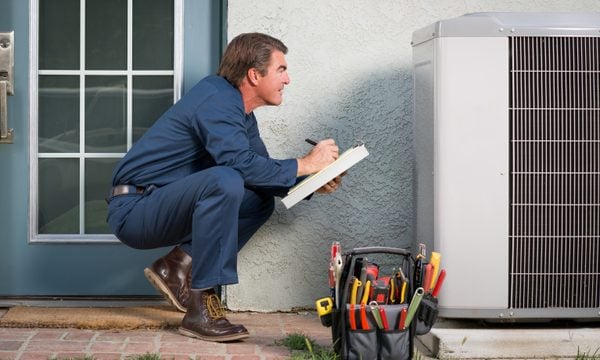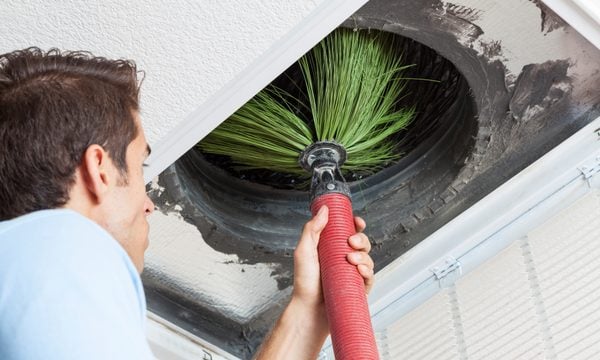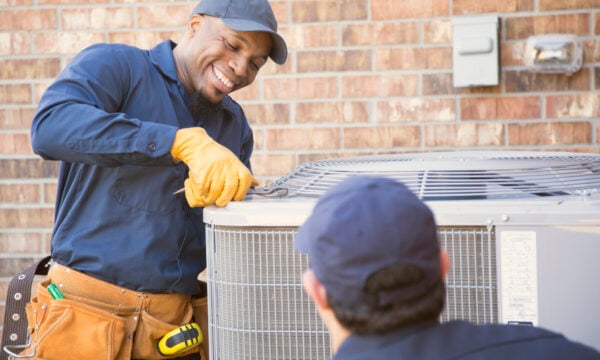Air Conditioner Replacement Cost in 2026: 6 Ways to Save
Replacing an air conditioner is expensive, but there are some ways to save.

Some or all of the mortgage lenders featured on our site are advertising partners of NerdWallet, but this does not influence our evaluations, lender star ratings or the order in which lenders are listed on the page. Our opinions are our own. Here is a list of our partners.
The cost to replace an air conditioner can vary widely, from as low as $150 for a window unit to up to $20,000 to replace an entire central air system with ductwork.
The total cost to replace an AC unit or system depends on factors including the type of unit you choose, the energy efficiency and your existing infrastructure. You may be able to replace your air conditioning for less if you live in a low-cost-of-living area where labor is less expensive, if your home is fairly small or if your ductwork is in great condition.
Nerdy Perspective
"Replacing your AC unit can be pricey upfront, especially if you need to update your ductwork, electrical wiring or plumbing to go along with it. But investing in a functional system now can help prevent costly repairs down the road, including leaks that could lead to added property damage."

1. Type of unit
Depending on what type of system you have, replacing an AC unit can vary in cost. These are the options:
- Window unit: $150 to $1,000. You can install this type of unit yourself. It can cool a room or two.
- Central air unit: $2,500 to $4,500. Central air units are the most popular choice for homeowners and can cool an entire house, depending on the square footage. The unit can be installed on the side of the house or in the backyard.
- Split system: $2,000 to $3,000. This type of system has an indoor unit and an outdoor unit, and can be ducted or ductless. Energy-efficient ductless mini-splits are growing in popularity for small homes.
- Geothermal or air-source heat pump: $4,200 to $12,000. Geothermal pumps transfer heat or cooling from the ground into your home, while air-source pumps remove hot air from the outside and transfer it inside, or vice versa, depending on the season.
2. Replacing instead of repairing
Many air conditioners have a lifespan of 15-20 years. However, there have been major improvements in efficiency in the last 10-15 years; many new systems are between 30% and 50% more efficient than older air conditioning units in homes across the United States, which could be a motivating factor to replace your unit sooner so you can start reducing your energy bills.
If you’ve had repeated repairs on your unit, it may be reaching the end of its lifespan. Replacing compressors or blower motors multiple times can add up in terms of cost. “If the cost of a repair equals half the price of a new unit, choose a complete replacement,” said Keith Wortsmith, President of DASH Heating & Cooling.
» MORE: The cost to install central air
3. Upgrading for energy efficiency
Air conditioner efficiency is based on seasonal energy efficiency ratios (SEER). A system with a higher SEER rating is typically more expensive upfront, but can reduce your long-term operating costs .
If you’re looking to save some money upfront and later via lower bills, there are various tax credits and rebates available for buying efficient air conditioner units. Your local electric company may have rebates available, and the DSIRE database may list energy efficiency incentives in your state.
Advertisement



HELOC & Home Equity Loans from our partners

on FourLeaf Federal Credit Union
FourLeaf Federal Credit Union 

Min. credit score
670
Max. loan amount
$1,000,000

on Achieve
Achieve 

Min. credit score
600
Max. loan amount
$300,000

on Figure
Figure 

Min. credit score
600
Max. loan amount
$750,000
4. Combining furnace and AC replacement
If your furnace isn’t compatible with the new air conditioner, you might need to replace the furnace at the same time. When your central air conditioning needs replacing, some people opt to switch to an Energy Star heat pump system, which replaces both your heating and your cooling. This type of system can help reduce your future heating and cooling bills.
» MORE: Best HVAC financing options
5. Time of year
Labor costs vary throughout the year due to demand. “If it’s not an urgent replacement, wait until fall or early spring to update your current air conditioning system. Fall and early spring are when HVAC technicians are less busy with heating and cooling system installations and often offer discounts on their services to attract customers.
“Additionally, AC unit prices tend to drop by the middle of fall and start rising again after April,” says Wortsmith. Consider whether you can safely wait until early spring or fall (the slow seasons) to replace your air conditioner.
6. DIY installation
The majority of air conditioner repair and replacement requires complex, skilled labor by professionals, especially if other systems, like plumbing or electrical, also need repair to complete the AC replacement.
You can reduce professional labor costs by doing some of the extra labor yourself, such as removing the old unit and disposing of it yourself, or even applying for your own permit if possible.
What Reddit users say about replacing an air conditioner
Reddit is an online forum where users share their thoughts in “threads” on various topics. The popular site includes plenty of discussion on financial subjects like home improvement, so we sifted through Reddit forums to get a pulse check on how users feel about air conditioner costs and ways to save. People post anonymously, so we cannot confirm their individual experiences or circumstances.
Many Reddit comments about replacing air conditioners suggest holding onto your old air conditioner as long as possible (typically until it fully breaks) if it’s still working, even if you need to schedule the occasional repair. If you do choose to hold out, Reddit users recommend keeping the replacement cash on hand and preparing for the possible inconvenience of losing cooling power during the hottest time of year, when AC units are more likely to give out.
Frequently Asked Questions
Do I need to replace my ductwork when replacing an AC unit?
Some homes have pre-existing ductwork that is efficient and in good working order. However, some homes have substantial leaks and poor connections that, if not repaired, can lower the efficiency of the replacement air conditioning system.
If you need substantial ductwork repair or replacement, you’ll see additional costs in labor and ductwork materials — at least $1,400 for replacement and as high as $17,000 for new installation for a 2,500 square foot home.
Can I replace an AC unit on my own?
You can typically DIY replacement with simpler units, such as a window unit or a mini-split system, but a more complex system, like a central air unit attached to ductwork, will likely require professional installation.
Article sources
NerdWallet writers are subject matter authorities who use primary,
trustworthy sources to inform their work, including peer-reviewed
studies, government websites, academic research and interviews with
industry experts. All content is fact-checked for accuracy, timeliness
and relevance. You can learn more about NerdWallet's high
standards for journalism by reading our
editorial guidelines.
- 1. U.S. Department of Energy. Explaining Central Air Conditioner & Heat Pump Standards. Accessed Mar 5, 2025.
More like this
Related articles









